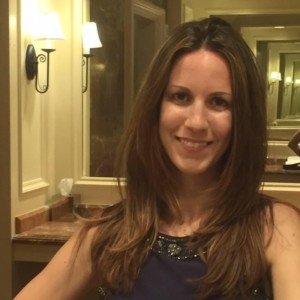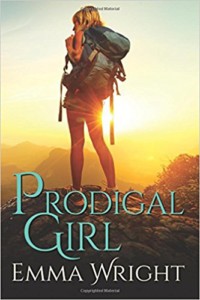Title: Prodigal Girl
Author: Emma Wright
Publisher: CreateSpace
ISBN: 9781545387575
Pages: 314
Genre: Women’s Fiction
Reviewed by: Anita Lock
Author Interview with Emma Wright
 PBR: What or whom would you say is the real spark that got you into writing?
PBR: What or whom would you say is the real spark that got you into writing?
Definitely my mum. She was a writer, an artist, a poet, quite gifted and I guess some of it rubbed off. I was still in school when she died in 2006 after a five-year battle with breast cancer, and she had started to write a book, a Regency Romance before then. I picked up her unfinished manuscript years later and decided to finish it as she might have imagined, and when it was done I thought ‘hmm … not bad, girl’. No stopping me then.
PBR: Who are your favorite authors and why?
I like works that draw me deep into an experience, make me think, feel, laugh at times, cringe or well tears at others, as opposed to being strictly entertained by a story. Strayed is very good at this. Gilbert, too. I tried to do the same with Prodigal Girl, plop readers into Jamie’s adventures, have them see what she sees, experience, then feel, think.
PBR: Your bio mentions what you needed for your debut novel was ‘a great story’, and you ‘found it in the journals of a young British-American woman who gave up everything, or so people believed, to follow her dream of traveling the world.’ Lots of people have dreams. What in particular fascinated you about this woman to inspire you to write Prodigal Girl?
It’s a familiar theme – young, restless, little to lose so follow a dream others thought impossible, experience and see what happens. I’d heard some of her stories verbally, and when I asked if I could look at her journals I realized there was so much more to this story than exotic experiences or following her dream. Much of Prodigal Girl is about ‘experience and see what happens’, but the real story is what it all means and how Jamie evolves as an individual.
PBR: In some respects your story resembles those of long ago when people dared to explore new places. Certainly in the early 90’s people had information on the places Jamie traveled, but that was before the World Wide Web became a powerful resource. Do you think there was more of an eagerness to travel during the pre-technology period than post?
People travel for different reasons, but travelers like Jamie do so to explore, to experience things they’ve never before experienced. This hasn’t changed much since the beginning of time. True, she begins her travels using a written guide, but this is quickly abandoned based upon information she receives from other travelers. Internet or not, this is the real way word gets around in the traveling world. In the book she changes plans time and again based upon what she’s picked up from this or that traveler.
PBR: Again, in the early 90’s women’s rights were still brewing. Do you think Jamie exemplifies the true spirit of freedom (from stigmatized gender roles) that women were fighting for?
She certainly chose a path that raised eyebrows with others, but at the story’s beginning Jamie is plagued with doubts about her choices. It’s not until she experiences her adventures and they begin to mount up we see an evolution in her spirit, that she knows she can handle what comes out of the woodwork, that she’s free, alive and living. There’s conflict along the way – “give me the old girl, the one I remember” – but that girl had moved on by then and doesn’t need anyone to allow her freedom to live as she chooses to live.
PBR: One fascinating area of your narrative is Jamie’s continual inner turmoil between her mind and body. Some readers may interpret that as a sign of low self-esteem. Other readers may see her struggle between self and society’s stigmas on a woman. Do you have any expectations as to how your audience will respond to Jamie’s struggles?
I hope they see themselves or some part of themselves as Jamie, then just dive in, experience, explore, feel and not interpret, but view Jamie’s struggles as part of an evolution. There’s a line near the book’s end – “For the first time in my life since I could remember anything at all, my mind, body and spirit are at peace with each other. I knew it had happened, but it was a quandary how it came to be that way.” Like many of us Jamie’s mind, body and spirit had become disconnected by what we call ‘life’, and that’s when restlessness, dreaming rather than doing, live rather than living can take over. Mostly it was Jamie’s spirit, her passion that had gone off and gotten lost, and that’s where much of the turmoil stems. A lesson for us all, but despite all her reservations Jamie took a leap of faith without any promise of an outcome, chose to do rather than dream and living over life. Her way to glue mind, body and spirit back together was to venture some of the most exotic places on earth and open her senses to it all.
PBR: Your bio mentions the young British-American who inspired this story is ‘still traveling today – 58 countries so far’. I’m curious whether this gal sees traveling in post-9/11 America is easier or harder than back in the 90’s.
Iceland was recently added, so it’s up to 59 now. Travel in the West has certainly changed post-9/11, but it hasn’t changed as much in the still-developing world where she’s traveled the most. There are places in this world, however, where it can be very uncomfortable for a single woman to travel, even dangerous, and she’s been to some of those places.
PBR: Again, your bio mentions Prodigal Girl is ‘the first of a planned series’. How many books do you envision creating for this series?
Not in order, but there’s India, Africa and South America, so four in all. She’s had many adventures around Europe as well, but they were not all at one time like Prodigal Girl.
PBR: Do you foresee other projects beyond your new series, or any other genres you might want to explore?
Yes, certainly, and I’ve already finished two manuscript outlines. One is a mystery/thriller about a group of physicians who collude to cover up malpractice that resulted in a person’s death, the other a YA novel about girls’ soccer – a particular passion of mine when I was growing up. I hope to be busy for a long while to come.


